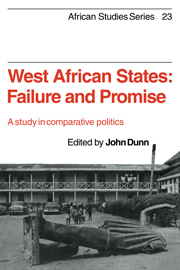6 - Nigeria
Published online by Cambridge University Press: 19 January 2010
Summary
politics and political economy
‘Politics is a dirty business’, as the Concise Oxford Dictionary reminds us. It is also ‘the science and art of government’. In its first aspect, politics is a particular, and discreditable activity, whose virtue is to be ‘scheming, crafty’, and which turns on the private advantage of its practitioners. In its second aspect, politics is concerned with the administration of the common affairs of the public, a matter of universal rather than particular concern, whose virtue is to be ‘judicious, expedient’ in both defining and promoting the common good. The contradiction between private interests and the public interest gives rise to, but is not resolved by, the state. The state is required both to mediate among competing interests, and to reconcile or subordinate them to the wider requirements of the public interest.
Politics thus has two related dimensions, the competitive pursuit of private interests, and the determination of public policy. But the nature of both private and public interests is defined by class relations. Classes are groups which arise out the division of labour in society. They are defined by their place in the process of production, their access to markets for commodities, including labour power, and their relation to the state. Where producers have access to their own means of production, surplus expropriation takes place through control of market and state relations. Class relations link together different groups within societies, and between societies.
Classes may be stabilized into accepted relations of domination and subordination, or organized into relations of patronage and clientage.
- Type
- Chapter
- Information
- West African States: Failure and PromiseA Study in Comparative Politics, pp. 132 - 172Publisher: Cambridge University PressPrint publication year: 1978
- 7
- Cited by

